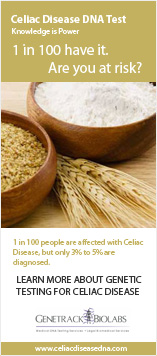Understanding Your Results

Find out if you are at risk - get tested
| TEST | TESTING TIME | PRICE |
|---|---|---|
| DNA Celiac Disease Test | 4 to 6 weeks | $249 USD |
Understanding Your Results
The possible results obtained after DNA testing are as follow:
Other Factors Associated with Celiac Disease
If an individual has tested negative for all of the celiac disease-associated alleles (HLA-DQA1*05, HLA-DQB1*02 and HLA-DQB1*0302), then a diagnosis of celiac disease can essentially be excluded. An absence of celiac disease-associated alleles reduces the lifetime risk of developing celiac disease to well below 0.04%, independent of diet. Individuals who test negative for celiac disease-associated alleles will not pass a celiac disease-associated allele to the next generation.
Positive, celiac disease-associated alleles detected
If an individual has tested positive for one or more than one copies of the celiac disease-associated alleles HLA-DQA1*05, HLA-DQB1*02 and HLA-DQB1*0302, or heterodimers DQ2 and DQ8, then a diagnosis of celiac disease cannot be ruled out. Relatives of individuals who have tested positive for one or more celiac disease-associated alleles are also at risk for being positive. The presence of the celiac disease-associated alleles implies an increased risk for celiac disease, but is not diagnostic of celiac disease as only a subset of individuals with these alleles will develop celiac disease. The estimated risk for developing celiac disease for each genotype is listed in the table below:
| Patient Genotype (Celiac disease-associated alleles) | Celiac Disease Risk* |
|---|---|
| DQ2 and DQ8 | 1:7 |
| DQ2 and Homozygous HLA-DQB1*02 | 1:10 |
| DQ2 and DQ2 | 1:10 |
| DQ2 and DQ2 | 1:10 |
| DQ8 and DQ8 | 1:12 |
| DQ8 and HLA-DQB1*02 | 1:24 |
| Homozygous HLA-DQB1*02 | 1:26 |
| DQ2 | 1:35 |
| DQ8 | 1:89 |
| Heterozygous HLA-DQB1*02 | 1:210 |
| Heterozygous HLA-DQA1*05 | 1:1842 |
* Megiorni F, et al. HLA-DQ and risk gradient for celiac disease. Hum Immunol. 2009; 70: 55-59.


